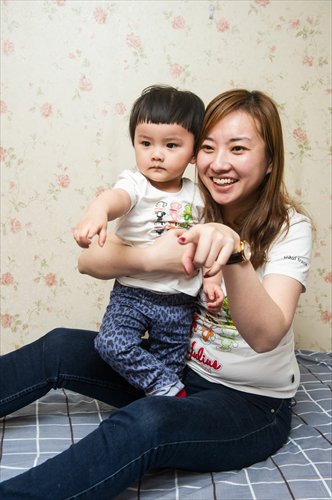Nice genes
Do children inherit specific genetic traits from their mothers and others from their fathers?

According to recent studies, genetic inheritance accounts for 20 to 40 percent of a child's intelligence. Photo: Li Hao/GT
Is a child's intelligence inherited primarily from his or her mother?
Many in China are pondering the question after a short Sina Weibo article was posted last week asserting that a mother's genetic makeup had three times as much influence in determining a child's intelligence as a father's.
"To know whether a son will be intelligent or not, one need only look to the mother," the article reads. "For men who consider themselves unintelligent, it is essential they find themselves a smart wife."
The article, which has since been forwarded more than 1.1 million times, also claims a child's personality and height are primarily inherited from the father.
The explanation given is that the genes that determine intelligence are located in the X chromosome, inherited mainly from a child's mother. As for personality and height, the article does not provide any reasoning. The article does not cite any scientific studies or provide any sources for any of its claims.
Si Dayong, a professor of evolution at Jilin University, rejected the assertions made in the Weibo article outright. "Sex-specific inheritance has little to do with X and Y chromosomes, but a kind of epigenetic inheritance [traits that are not caused by changes in the DNA sequence, but changes in gene expression]," he said "I have not found any particular traits that are inherited more from one's mother or father."
Inherited intelligence
A study that appeared in academic journal Behavior Science in 1982 looking at parent-offspring correlations for IQ noted that the correlation between a mother's intelligence and a child's intelligence was slightly higher at 0.464 than that of a father and a child at 0.423.
"I don't think this slight difference is statistically significant," said Si. "After all, genetic inheritance is random and complicated beyond human imagination."
While it has long been accepted that heredity plays a part in determining a child's intelligence, recent studies have suggested that it has less of a role than previously thought.
A 2013 study conducted by researchers from the University of Queensland analyzing DNA and IQ test results of more than 18,000 children from Australia, the Netherlands, the UK and the US found that heredity accounted for 20 to 40 percent of variation of childhood IQ, which is lower than the 40 to 50 percent estimated by earlier research.
Researchers further concluded that there was no single gene variant that could strongly predict childhood intelligence, and that genetically inherited intelligence was the cumulative effect of many different genes.
Zhao Bowen, a researcher at Shenzhen Huada Gene Research Institute, elaborated on the findings in an article on knowgene.com in 2014.
"Presently, no DNA site directly deciding human intelligence has been found," he said. "Parents' genetic influence on a child's intelligence is more or less even, and a child's intelligence tends to belong to a normal distribution curve, with the average of both parents' intelligence level as the median."
Xu Gelin, doctor of neurology at Nanjing General Hospital of Nanjing Military Command, noted in a Jinling Evening News report published in November 2014 that genetic heredity was highly complicated and random, and that both the mother and father had varying degrees of genetic influence on their child.
"For example, if the mother has a high IQ, and the father has a low IQ, their child will most likely be somewhere in the middle," said Xu, in direct contradiction to the claim in the Sina Weibo article that "one need only look to the mother" to know a child's intelligence.
"Of course, it is well accepted that a child whose parents both have high IQs will generally be quite smart."

Environment and upbringing are considered to be just as crucial if not more so than genetic inheritance in a person's life-long development. Photo: Li Hao/GT
Tall or short, good-looking or ugly?
The results of a study conducted by the Royal Devon and Exeter Hospital and Peninsula Medical School found that fathers have a greater influence on a child's height, whereas mothers have more of a child's weight.
The study looked at the height and weight of 1,150 children at birth, then again as 3-month-olds, 1-year-olds and 2-year-olds. Researchers found that taller fathers produce longer babies at birth, while a mother's body mass index (BMI) was the main determinant in a child's weight.
Xu said that genetic inheritance was a major factor in a person's height, but that it was more complicated than simply saying that a tall father will produce a tall child.
"In reality, 23 pairs of chromosomes combine randomly to determine a person's height and other physiological traits," said Xu.
"There are also instances where both parents are tall, but their child is short, or where both parents are short, but their child is tall."
Also affecting height, weight and other physical traits such as eye color and hair color, were whether particular genes passed down by mother or father were dominant or recessive, and how those dominant or recessive genes combined.
As an example, Xu said that the gene for double eyelids is dominant while the gene for single eyelids is recessive.
A child with one double-eyelids gene and one single-eyelids gene would have double-eyelids, but to have single-eyelids, the child would need to inherit the recessive single-eyelid gene from both parents.
A guokr.com report in 2011 noted that for Asians, curly hair is recessive whereas for most Caucasians, it is dominant.
There were also a number of other genetic processes that could affect a person's physiological make up, including complementation, overlap, suppression and mutation, said Xu.
"Beyond genetic factors like heredity and mutation, a child's personality, body height and eyesight are hugely affected by environmental factors, such as physical exercise, nutrition and upbringing," said Xu.
Environment and upbringing
It is widely accepted by scientists and experts that environmental and cultural factors play a major role in determining a child's development, particularly as he or she reaches adulthood.
"I've always prescribed to the old Chinese saying: 'Do one's level best and leave the rest to God's will,'" said Zhao.
"We should know what we already have inherited, among which are unchangeable parts and changeable parts. We make good use of the unchangeable parts, and try to improve those changeable parts by cultivating our potential through the optimal environment."
While there have been studies investigating the role of genetic inheritance in a child's personality, Xu said that there was no consensus on the degree of influence genetics had, and that in his opinion, a child's upbringing played an even more significant role in shaping personality and intelligence.
"During a child's development, he or she automatically learns from and imitates the people closest to him or her," said Xu.
"When we say that a child's personality is more like the father's or mother's, it is simply a case that the child has imitated that particular parent more closely."